I have decided to post the beginning of my story centering on Man Tower. There is another version, involving scripture following along, aligned and synchronized with scripture utilized by Thomas of Celino in his biography of St Francis of Assist. I like that version better. I put this together on my phone, supplying punctuation and paragraphs awkwardly in correction. Mistakes I am positive will be involved. However the effect is accomplished.
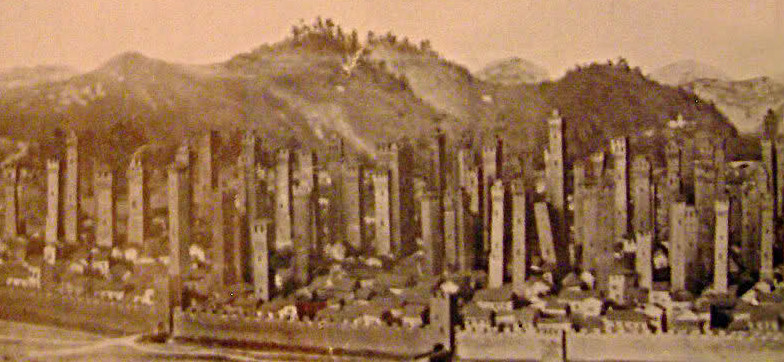
Medieval Towers
Breathing, the encompassing view of Assisi from the Rocca Maggiore, allowed the outcast orphan no reprieve from the anguish of a childhood within its fortified walls. Spectacular in nature, the sweeping vista offered the city and surroundings in splendor: churches and military tower fortifications dominating, flourishing valleys beyond defensive walls; meandering roads within and without, and in the far distance the rise of mountains—beauty unmistakable. Man alive, bourgeoning.
Not all observers could perceive the allure. One unable to appreciate was tall in stature. Amongst the troops of Emperor Fredrick I, Barbarossa, convalescing from the monumental treaty signing with Pope Alexander III, Alberto the Vanquisher saw nothing of the majesty. Assisi produced tension, a distancing. Regarding a return to the city of his rearing, indifference dominated, tainted by an underlying of bitterness. There would be peace in the lands, yet in his heart emotion churned. All meant nothing to the Vanquisher. He would wander. He felt no need to remain loyal to Barbarossa during a state of peace. What was the need to stay with foreign troops if there was no war?
The Rocca Maggori, constructed after the conquering of Charlemagne, towered over the city of Assisi. The intimidating citadel staunchly rose from the highest point of Assisi, once sitting within Roman walls. Conrad of Urslingen now resided at the feudal castle. Appointed by Barbarossa, the Holy Roman Emperor, as Duke of Spoleto and Count of Assisi, the man carried a corrupt reputation due to his association with Christian of Mainz, the archbishop of ill-repute. The people of Assisi viewed the towering structure with no admiration. Meant to be a sign of power and esteem, its presence created loathing, subjugation bellowing from its tower.
Alberto the Vanquisher placed himself beyond images and structures attached to identities. He rested from battle upon a high point with a castle surrounding him. Details were unnecessary. A nonentity apart from the killing force he became, the fact he was a child within Assisi meant little. Antipathy being the only remaining trace from the years of a young one.
“Fierceness of Silence. You sit alone observing your city. What are you thinking?”
Alberto did not reply, yet a slight turn of his head, distinct as he only moved his eyes, allowed the commander to know he recognized his presence. The commander tagged him with the nickname due to his lack of speech. He held to silence, a thing few men could accomplish amongst warring troops. Skill in battle, tremendous size, standing over six foot six, allowed him advantages.
“Ah once more you hold your tongue. I am through with you. The emperor is moving on. We no longer hold you to service. You are free to do as you please. God have mercy upon the men who endure your travels.”
The commander threw a sack of coins. Alberto nodded, keeping his eyes on Assisi. He rose, heading for his horses and armor. Ignoring the sounds of the men celebrating, he prepared for departure. No farewells would be conducted.
Galloping the short distance to the walls of Assisi, memories emerged, a broken introduction to adulthood dominating. The travel altered his thoughts. Without armor, without surrounding commanders, knights, and foot soldiers, he experienced an aberration.
It had been years since he rode so exposed. Unable to blank his mind into a concentration of brutality, he opened a bit to the sun shining. Without the covering of metal, he fully felt the wind upon his face. His hard heart beat more than a life sustaining organ. Thoughts softened, the further he moved from foreign troops.
In Assisi, he grew as a child. The complexities and loss of innocence remained a neglected mystery, forming unconscious barriers and resistance, creating a knight of distinguished reverence. Reconciliation with his past was not considered. Leaving as a child, believing himself to be a victim of a cruel hoax, he parted a monster. Returning with his warrior mentality hindered, he thought of his mother. He would seek her. He must discover whether she was alive. Lepers could not be counted on for life.
“It’s the one who betrays his own for wealth. May God curse your soul, man harass your days, and demons disturb your nights.”
“Silence my friend. You know who he is. It is the Man Tower. He kills simply for the thrill of seeing others die.”
“I am not afraid of the bastard child of a priest. From conception to death, he is an unnatural life, one who should have never been brought into being. Evil gave him birth, while also sealing his fate. He stands no chance of redemption. He rode with the ruthless archbishop of Mainz against his own people. The apple does not fall far from the tree. His father and mother were rotten and into rottenness he grew. You good for nothing war whore born of severe sin why return to plague us. We are good men and woman struggling, as a society, against the essence and totality of who you are. You are wickedness.”
An old man, accompanied by another elder, both so frail it seemed death was only days away, confronted Alberto upon his horse. The man spit in his direction.
Alberto halted his horses, observing the old men. Feeling nothing, he easily controlled the desire to kill. Reaching toward his sword, he only massaged his back. He kept his eyes upon the old men. One stared with vengeance. The other quaked in his boots.
Alberto retrieved a portion of bread from his rations, tossing it to the one who stared.
“I should refuse your bribe, yet there are others who can benefit.”
The one who quaked picked up the bread.
“Let us go before the stench of the man finally ends our days of suffering.”
“Away, we must go. The night is upon us and the orgy moves our way.”
Bread in hand, the old men moved on. Alberto proceeded slowly, recalling his days with the archbishop Christian of Mainz. None were bloodier.
Tuscany felt the rage of the archbishop. Alberto joined him as he moved into Umbria. His forces, fighting for Barbarossa, met no opposition they could not smash. A spectacle, the rapacious warrior priest, wielding a hammer for the smashing of armor, was always first in battle. Demanding excess, he devoured the lands and people he conquered. With no conscious, his troops raped and plundered. His journey was a bloody circus of war. Bivouacking with a harem, he rollicked upon the lands he destroyed, surreally worshipping absurdity in both life and death. In truth, there was no higher law than chaos itself. A charmer and romancer, none could refuse his eloquence when he turned it on. Usually off, combat his natural mode, it was worse for his foe. His troops reaped the rewards of the brutal carousing. If luck prevailed, when the Sabbath arrived, the troops enjoyed the archbishop conducting mass.
Alberto, unseasoned upon joining the ranks of the archbishop, earned a dastardly reputation. His enigmatic distance between life and others created a void easily filled by the archbishop’s militaristic pandemonium. Performing for the imposing archbishop as a foot soldier, he showed no remorse or mercy fighting against his fellow Umbrians. Slaughtering, raping, ravaging, pillaging and inflicting his wrath upon the world as only one who sees himself as a victim can. He wanted all to know there were no ends he would not pursue in the bloodiness of battle. The bloodthirsty archbishop recognized his savagery, applauding his marauding, granting the mammoth youth a suit of armor after the annihilation of Terni. The troops rested for three days as the extra large armor was cast and refined.
Stories abounded about Alberto at Terni after he singlehandedly executed over a hundred men. Superiors condemned the captives. Peers brought them to him, forcing them to kneel before him. He removed their heads. Losing his mind during and after the executions, he wandered the city searching for women to penetrate, never bringing himself to climatic gratification. Physical pleasure consisted of sterility and disassociation. Internally, a lack of distinction existed regarding the removing of heads and raping of bodies. At night trying to sleep, he could feel his past dissolving, shadows filling the voids. The nonbeing of being and the being of nonbeing overwhelmed any desire for good.
Darkness settling in his return to Assisi with his armor upon his pack horse, Alberto recognized a parading commotion approaching.
Disturbing a pack of dogs, forcing them to flee, he positioned himself and his horses in an alley for observance. He would watch those of the world pass by in their charade. Another dog came aggressively attacking into the alley, a leash dragging along. Alberto dismounted, sword in hand, prepared to protect his startled horses. He wasted no time dispatching the dog, driving his sword deep into its body.
“NO! NO!”
A boy came bursting into the alley. Weeping, he fell upon the dead dog. His tear stained face turned up to Alberto filled with fury. He drew a small knife as he crawled away from his dog. Sizing up Alberto, the panting boy knew he stood no chance, yet he could not flee due to the strength of his desire for revenge. He had to keep the object of scorn within view.
Alberto spoke. “Go child before you get yourself killed. There are other dogs to be tamed.”
Drumming from the street, bawdy singing, drew the attention of both Alberto and the boy. Absurdly another boy appeared. Leading a raucous procession, a boy costumed as a bishop, staff in hand, bishop’s hat, marched himself as the highest local religious authority. Regally passing, he overdramatically played his role. Surrounding the boy, were other boys pretending to be administers, lauding their ridiculous superior. Drunken adults participated also. Dancing and marching in honor of the miniature bishop. Loudest of all came a cart pulled by oxen. Crazy screaming voices demanding attention. Male drummers sang warnings of the evils of women danced around the cart. Atop the cart, swigging wine, laughing crazily, scantily clad women caroused.
The procession halted, the cart in front of Alberto’s alley. The men threw whatever they could at the women and the women posed themselves in scandalous positions. One shaking her naked breast at the world noticed Alberto in the alley.
“Tall knight in the alley I see you. Put on your armor and save me don’t you recognize me?”
The woman removed her skirt, running her hands over her body. Alberto watched.
“Tall knight you do not recognize me. I am the princess and they are leading me to be fed to the dragon. It was my horrible lot to be chosen as a sacrifice. Please save me.”
The others carrying torches all joined in as they noticed Alberto. Alberto stepped out from the darkness of the alley. The boy steadied his horses. The women on the cart began moaning, two embracing in a drunken kiss. Attention was upon Alberto.
“You have come for the princess. I know you. I know you.” The naked woman waved her finger at Alberto. She turned, bending over, exposing her backside in a sensual manner. She turned back, licking her fingers.
“Come up here on the cart tall handsome knight because you have been exposed. All know you are St. George. You have been sent to save us.”
“St. George. St. George.”
“St. George save us.”
“Yes, save us from ourselves.”
The laughing reached a fever pitch as the procession once again proceeded forward. The naked woman fell as the cart jerked forward. It did not dampen her spirits as she manically bellowed upon her back.
As the flesh peddling cart and the final revelers paraded forward, a contrasting crowd followed. Old men and women, some huddling in tears, some praying rosaries, others pointing and scolding, trailed in the wake of the merrymakers. One carried a large cross. Following the reproaching elderly, flagellators, men screaming for repentance stumbled along, demanding retribution for scandalous, rebellious ways. Bloodied, appearing as if self-torture were a way of life, the final portion of the procession moved passed Alberto.
Alberto returned to his horses, taking the reins from the boy. He observed the scrawny lad closer. His tattered clothes pronounced the status of a street child, a waif. He recalled the fierceness within the boy’s eyes as he drew his knife.
“You live alone upon the streets?”
“There are other boys I run with, however now they want to kill me.”
“Why?”
“They say I stole from one of the other boys while he slept.”
“Did you?”
The boy looked into Alberto’s eyes. “No and now my dog is dead.”
“So what do you do?”
“They will find me. I must flee the city.”
“Come with me.”
Startled, the boy could not speak.
“Do you think you can build fires and perform the task I will demand of you?”
The fierceness that was in the boy’s eyes upon drawing his knife returned. He straightened himself to his greatest height.
“Yes.”
Alberto recognized something within the boy, something very familiar.
“You will be my squire. You can ride my warhorse. You are so light you will not burden him. You must be sure he remains tethered. The horse will kill you if he is not tied to me.”
Elegantly, the boy bowed.
“Rise. You will not bow to me. Just listen to me and do whatever I say. Even if you feel you know better, listen to me.”
“I will be obedient.”
“What is your name?”
“Ricco.”
“I am Alberto Abatantuono”
“You are the Man Tower.”
“I am known by many names. I allow none to claim me.”
The strangeness of the situation would not cease for the boy. He should have known who he was dealing with. No other knight possessed such great height. How did he not recognize the giant? Now the knight offered to take him into his services. The boy faced the situation, realizing it was beyond even his dreaming. He formed an inner fire, a conviction he would thrive. Everything he did for the knight, everything he did in general, would be done with the greatest effort and the greatest attention to detail. He was upon the brink of despair and now a future opened before him.
“Let’s leave the city.”
“Where are we going?”
“Do not ask questions. If I want you to know something I will tell you.”
“I understand.”
“When we are around others, do not speak. Speak only if commanded. Watch me. Follow my example. I never speak unless it is of the upmost importance. Observe and watch instead of speaking or preparing to speak. You are worthless to me if you are constantly filling your head with possible, desired, conversations. Eliminate chatter in the mind. Stop arguing, stop trying to impress people, stop pleading your case in your mind. Learn to observe with an unobstructed mind. Notice every little detail and movement. Surviving upon the streets, I suppose you are accomplished already. However, I will demand more. Like a hawk, I want your eyes to penetrate everything. It may save both of our lives.”
The boy did not answer, understanding the seriousness of the words. In reflection, it overwhelmed him Man Tower spoke of such permanency. In a matter of moments, his life transformed like a dream.
“Come here.”
The boy drew close to Alberto and his traveling horse. Alberto guided the nose of the horse into his hand. The horse nuzzled. The boy stroked the horse’s snout. Alberto stroked his mane. The action was performed also for the pack horse and warhorse. All three of the horses became familiar with the boy.
“You will lead them out of the city.”
Ricco drew away, turning his back to Man Tower. He went to his lifeless dog, stroking the corpse. He said nothing. Alberto appeared with a blanket, carefully gathering the dog in its fold. He secured the dog to his traveling horse.
“We will bury him outside the city. What did you call him?”
“Midnight for the darkness of the black that colored him.”
The entourage moved into the street, starting for the gate. Traveling only a few steps, a pack of ruthless boys appeared, blocking the street. The boys all held knives, and one sported a short sword. Alberto motioned to halt. The boy easily brought the horses to a controlled stop. Pleased, Alberto saw the horses already recognized his command, something they would not do for a nervous being.
“Are you children looking for something?”
“Yeah we want that thief hiding under your skirt.”
Alberto drew his sword.
“That is the last insult you will utter to me. Show me this thief and I will assist you in apprehending him.”
“He is right there, holding your horses.”
“You are mistaken. That is no thief. That is my squire. My squire I will protect to the death. Move aside children. Do you not recognize me?”
The boys whispered amongst each other, looking back and forth from Alberto to one another.
“Man Tower.”
“I will make a deal. In order to pass, I will pay a toll.”
The boys remained silent, staring with as much bravado as they could muster. Alberto retrieved some coins, tossing them to the boys. Greedily, they retrieved the coins, disappearing in argument regarding shares. Alberto imagined one or two of them would die in the settlement. He motioned to advance. Ricco and the horses responded. Again Alberto was pleased with the response of the horses to the commands of Ricco. The horses already accepted him.
“After burying Midnight, we will get you some proper clothing and footing.”
Ricco look into Alberto’s eyes, holding his attention. There was a strange light coming from somewhere unknown. Torch lights from a hidden place. Alberto held the stare. Within the boy’s eyes was the question why, and more impressive to Alberto restrained tears. Alberto perceived the anguish of one of so little years; a weighty, hopeless loneliness dominating. Unperceived to the bearer; intelligence, strength and loyalty were there within Ricco’s eyes. Warring, Alberto had been around many men. Percipient, he knew how to read a man, or in this case a boy.



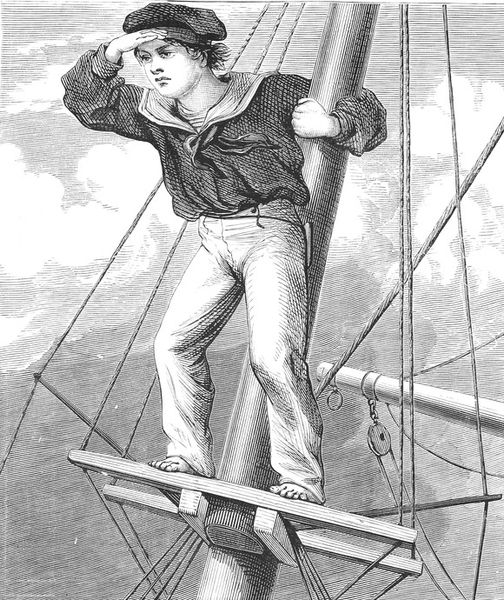

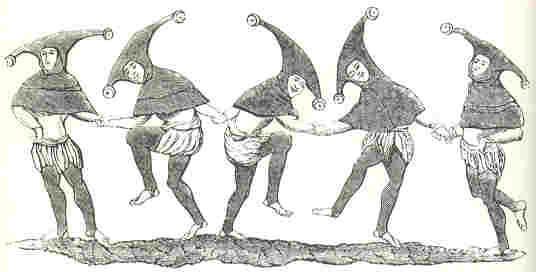

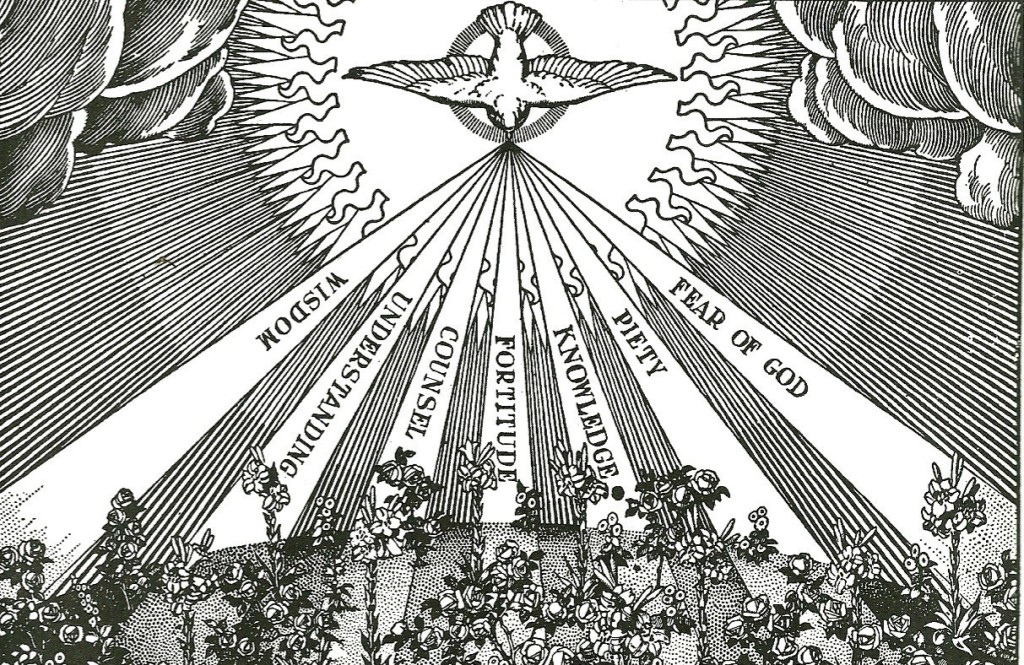
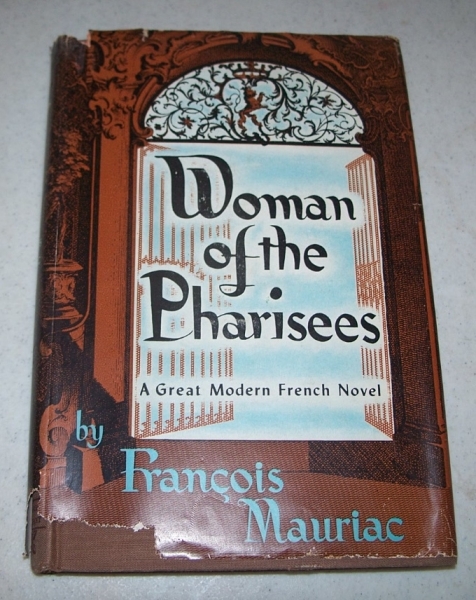
Recent Comments